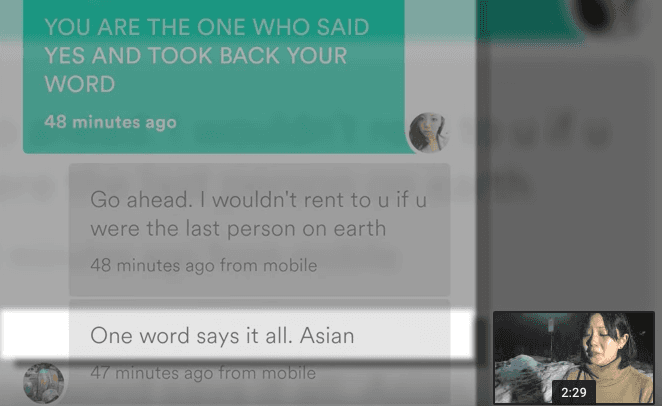
If you are an Airbnb host who declines a reservation judging by someone’s appearance on your smartphone, you had better keep those dates blocked on your calendar. You would also be wise to have a really good explanation of why that reservation was declined, both to the spurned guest and to Airbnb. And finally, you should definitely not be arrogant, imperious and clueless enough to text, “One word says it all. Asian” minutes before your guest is scheduled to arrive after driving in the snow and in the middle of nowhere on a stormy February night.
If you made those questionable choices in California, the Department of Fair Housing and Employment (DFEH) could step in and hand down a fine of $5,000. That is what was announced late last week almost five months after UCLA law student Dyne Suh got into a dispute over the number of guests she could bring to a cabin near Big Bear Lake in Southern California. The texting exchange quickly devolved as the tone got nasty, and then the owner retorted that “It’s is why we have Trump.” Suh rehashed the incident and her feelings on YouTube, and Airbnb found itself in the middle of controversy yet again.
[embed]https://www.youtube.com/watch?v=nuZn8iVQbSc[/embed]
To Airbnb’s credit, the room-sharing service permanently terminated Tami Barker’s account soon after Suh’s video went viral and she complained to both Airbnb and DFEH. The agency quickly became involved, but DFEH went beyond simply assessing a fine. The agency reached an agreement with the former Airbnb host, who issued a personal apology to Suh. The cabin’s owner also agreed to comply with California’s anti-discrimination laws in the future, volunteer time at civil right organization, participate in a community education panel, report rental data to DFEH for the next five years and, most interestingly, enroll in a college-level Asian American studies course.
“There is a monetary cost to discriminating in California,” said DFEH Chief Counsel Jon Ichinaga, “a $4,000 minimum penalty for discrimination in places of public accommodation, which the Department will seek in all appropriate cases.” DFEH said it was also “heartened” by Barker’s willingness to resolve the matter in a forward-thinking and healing approach.
This is not the first time DFEH has become involved with how Airbnb hosts vet and accept guests. Earlier this year, the agency reached an agreement with Airbnb in which the service agreed to allow DFEH to conduct fair housing testing on certain hosts across California. The company also pledged to advise all users who believe they experienced discrimination to file a complaint with DFEH. Airbnb also agreed to report the rates of guest acceptances with a breakdown on race.
The DFEH case caps a long year for Airbnb, as the company had found itself under relentless criticism after African-American guests complained they were regularly discriminated against by hosts. A study issued last year found African-American guests were 16 percent more likely to be turned down for a rental request than members of other races. The company soon brought on former Attorney General Eric Holder to strengthen its anti-discrimination policy, much of which relies on the company effectively communicating renters’ rights and anti-discrimination laws to hosts. Come critics say the reforms still have not gone far enough.
Nevertheless, Airbnb has been aggressive in emailing its hosts on informing them what is acceptable when it comes to accepting or not accepting guests. The company has also tried to redeem itself in several ways; for example, earlier this year Airbnb said it would provide free housing to citizens and their families affected by the various travel bans imposed by the Trump Administration. And now those efforts have been capped by Suh’s case, which marks the first incident in which a government agency has fined a host for not complying with fair housing laws.
Image credit: YouTube

Leon Kaye has written for 3p since 2010 and become executive editor in 2018. His previous work includes writing for the Guardian as well as other online and print publications. In addition, he's worked in sales executive roles within technology and financial research companies, as well as for a public relations firm, for which he consulted with one of the globe’s leading sustainability initiatives. Currently living in Central California, he’s traveled to 70-plus countries and has lived and worked in South Korea, the United Arab Emirates and Uruguay.
Leon’s an alum of Fresno State, the University of Maryland, Baltimore County and the University of Southern California's Marshall Business School. He enjoys traveling abroad as well as exploring California’s Central Coast and the Sierra Nevadas.














